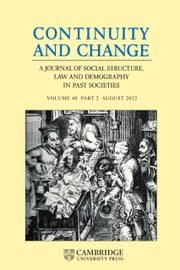Article contents
Reflections on the classification of causes of death
Published online by Cambridge University Press: 01 August 1997
Abstract
On November 11–14 1993, Indiana University hosted a conference on the ‘History of Registration of Causes of Death’, with funding from the US National Institute on Aging and the National Institute of Child Health and Human Development. The conference brought together historians of medicine and historically-oriented demographers and epidemiologists to discuss the origins of the recording of causes of death and the possible uses of these documents in demographic and epidemiological research. Demographers and epidemiologists would like to use long-run series of causes of death to examine the effects of social and economic conditions, the availability of health care, and specific risk factors on mortality. Many important questions (such as the effects of early health experiences on old-age morbidity and mortality) are best studied with data on changes over long periods of time. However, it is very difficult to construct a consistent series of deaths by cause over time because advances in medical theory and practice have led to significant changes in the classification of diseases. For example, it is unclear whether the prevalence of heart disease was increasing, decreasing, or constant before 1940, because heart disease was often classified under other categories.
The essays in this special number of Continuity and Change offer a range of insights on the historical circumstances in which cause-of-death registration emerged. They help us to see the ways in which medical theory, medical practitioners, and their increasingly influential professional organizations shaped the conceptualization of reporting of causes of death. Günter Risse's ‘Causes of death as a historical problem’ serves as an overview of the problems that social historians of medicine find underlying any continuous history of mortality experience. Above all, he argues, medical historians react as historians, wary of Whiggish confidence in state records without attention to the ideologies governing their creation.
- Type
- Research Article
- Information
- Copyright
- © 1997 Cambridge University Press
- 12
- Cited by


